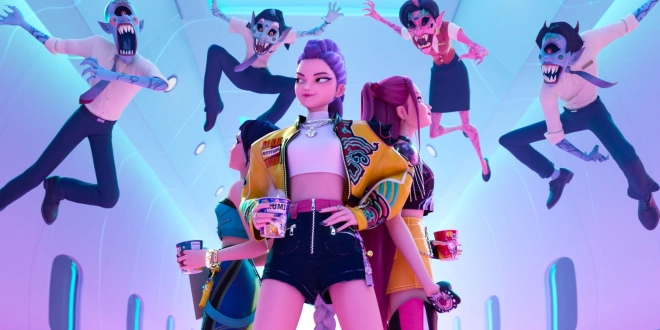Netflix’s animated sensation KPop Demon Hunters is on track to become the streaming platform’s most-watched original film ever, according to co-director Maggie Kang. The Korean-Canadian filmmaker described the movie as more than just a fantasy adventure—it’s a universal story about identity, shame, and the human need for acceptance.
A Record-Breaking Release
Since its June debut, KPop Demon Hunters has rapidly climbed Netflix’s charts, ranking as the platform’s most popular animated film to date and the second most-watched film overall. Its success follows in the footsteps of other Korean cultural phenomena such as Parasite, Squid Game, and Pachinko, proving the global appetite for Korean storytelling remains strong.
The film’s soundtrack has also become a worldwide hit. Multiple tracks, including the viral single Golden, have surged onto Billboard’s Streaming Songs chart, surpassing even heavyweights like BTS and BLACKPINK in some rankings. Golden is currently the most-streamed song in the United States.
Storyline and Themes
The animated adventure centers on HUNTR/X, a K-pop girl group secretly descended from a line of demon slayers. At its heart is Rumi, the group’s lead vocalist, who struggles with the pressure of concealing her dual identity while confronting a rival boy band made up of demons.
Kang explained that the narrative reflects a theme familiar to many: hiding aspects of oneself out of fear or shame. “I wanted to explore how people conceal parts of themselves and the journey toward acceptance,” she told reporters in Seoul.
Cinema, she added, offers a unique bridge between cultures. “Anywhere you go in the world, everybody wants the same things—they want love, security, and acceptance. When a story reflects that, it will always resonate globally.”
Cultural Roots and Inspirations
The film blends modern K-pop aesthetics with traditional Korean mythology. Viewers will recognize references to Seoul landmarks like the Olympic Stadium, Korean street foods such as gimbap and ramyeon, and rituals rooted in shamanic practice known as gut, historically led by women.
“I wanted to see a woman who isn’t afraid to look silly or eat messily—honestly, I just wanted to see someone like me,” Kang said.
Her influences include 1990s K-pop pioneers H.O.T. and Seo Taiji and Boys, alongside Oscar-winning filmmaker Bong Joon-ho. Kang also met with South Korean President Lee Jae Myung this week, who praised the global success of Korean culture and vowed to continue supporting it as a key industry.
Music That Moves Beyond the Screen
Music is central to the film’s appeal. Golden, now a global chart-topper, underwent seven or eight rewrites before Kang and her team felt it captured the emotional power they sought. “This movie is about the power of music,” she explained. “When a singer hits a high note and you feel butterflies—that’s what I wanted people to experience through the song.”
The film’s popularity has already rippled into the real world. Veteran K-pop stars such as Bada, Solji, and Ailee have shared their own covers of Golden online, while shares in Wooyang, a South Korean frozen gimbap exporter, surged thanks to the film’s spotlight on Korean cuisine.
More Than a Movie
Though not produced in South Korea, KPop Demon Hunters has sparked conversations in the K-pop industry and even influenced financial markets. Its mix of fantasy storytelling, cultural authenticity, and infectious music has made it one of Netflix’s most impactful releases of 2025.
Now streaming worldwide, the film has cemented itself as a pop culture crossover hit—part fantasy epic, part love letter to K-pop, and part exploration of what it means to embrace every side of ourselves.
 The Daily Star Ireland
The Daily Star Ireland



